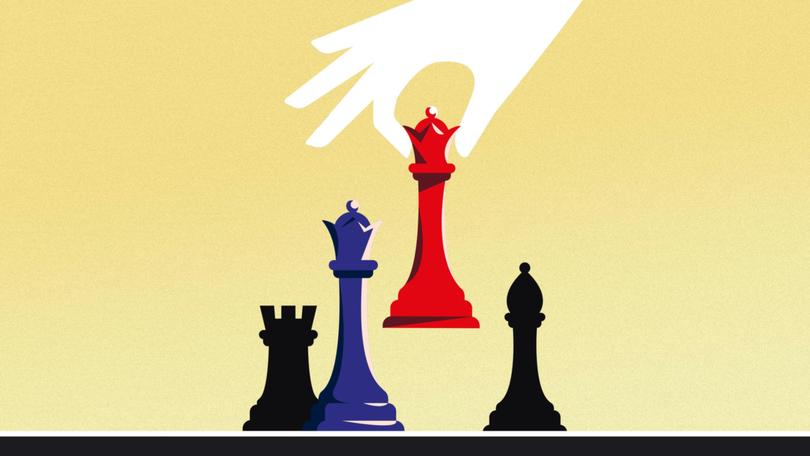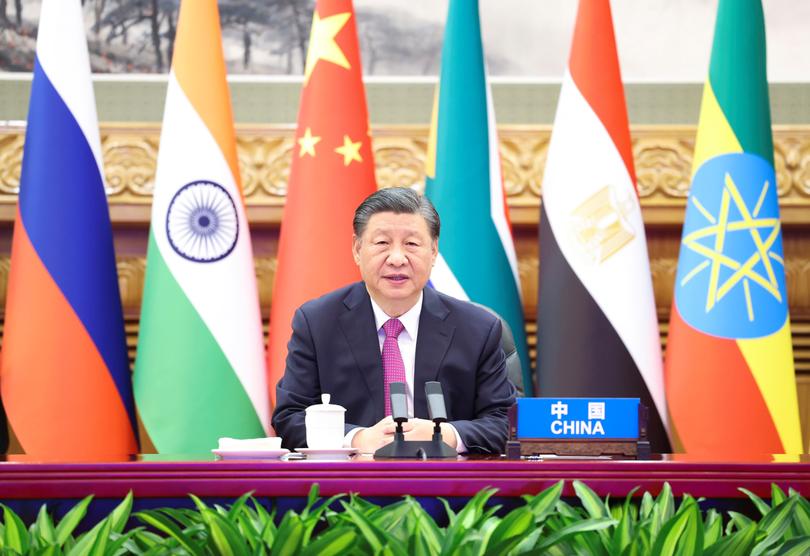Leading China expert Oriana Skylar Mastro urges Australia to be more assertive with Beijing
A leading US expert on China has urged Australia to be bolder in its dealings with Beijing and less afraid of upsetting the ruling Communist Party — or risk the political consequences of perceived weakness.

A leading US expert on China has urged Australia to be bolder in its dealings with Beijing and less afraid of upsetting the ruling Chinese Communist Party — or risk the political consequences of perceived weakness.
Oriana Skylar Mastro, assistant professor of political science at Stanford University and a United States Air Force reservist who serves as a strategic planner at Indo-Pacific Command, wrote one of the most definitive books of 2024 on the economic and military rise of China and its future strategy.
‘Upstart: How China Became a Great Power’, offers unique insights into Beijing’s rapid emergence from poverty to wealth and its current global ambitions as it challenges an international order that has long been based on the dominance of US military and financial might.
Sign up to The Nightly's newsletters.
Get the first look at the digital newspaper, curated daily stories and breaking headlines delivered to your inbox.
By continuing you agree to our Terms and Privacy Policy.Plumbing authoritative Chinese sources, Ms Mastro charts Beijing’s leap over just three decades from having about 3 per cent of global GDP to becoming the second largest economy in the world and the biggest manufacturer and exporter.
She demonstrates the country’s path from a barely existent military in the 1990s to possessing the most expansive Navy and most advanced cruise and ballistic missile program in the world today.
And she offers policy advice on how the United States, and its allies like Australia, can avoid miscalculations and better navigate relations with an assertive China to keep a competitive edge and protect their national sovereignty in a new era of great power competition.
In an interview in Canberra, Ms Mastro urged the Australian Government to maintain a firm tone with Beijing.
Her comments come at a time when Canberra is seeking to rebalance relations after the diplomatic low of 2020 that triggered a series of Chinese import bans on Australian commodities, and amid renewed regional uncertainty about Donald Trump’s proposed trade tariffs on the economic giant.
Moving forward, Australia should not be too “risk averse” over actions or opinions that could “provoke” China in an effort to pre-empt retaliatory measures, she said.
“The one thing I think is really important is deterring Chinese aggression,” she said, adding that Canberra was too unwilling to take necessary steps to protect itself out of fear of goading China’s leadership.
“If you deter China, you are restricting their options. They’re going to be unhappy. So, you can either have a China that is deterred from aggression and problematic behaviour, but is unhappy, or one that is happy and gets to do whatever it wants. You can’t really have both,” Ms Mastro argued.
“In Canberra, I see a lot of recognising that China is unhappy about something, and thinking and assuming that that is then going to lead to China to take unfavourable policies towards Australia,” she said.
“And what that means is the strategy is, ‘let’s just make sure we don’t do something that upsets China’.”

This, as a result, could lead to distancing from the US military, less investment in certain capabilities or suppressing views on certain issues, she suggested.
“That fear of provocation can lead to failures of deterrence in defence,” warned Ms Mastro.
The Stanford author was clear that she believes there is “no physical threat to Australia” from China. “I am not concerned of a Chinese invasion,” she stressed.
“But that doesn’t mean that China is not a threat, because what this book tells us is the nature of the international order has changed, such that China has determined, and I think rightfully so, that you no longer have to physically occupy a country to control their destiny,” she said.
“You can use other levers to do it. So, every country has to make a decision — in Australia, too, about the degree of sovereignty that they’re willing to give up in order to avoid conflict with China.”
Her book focuses more on China’s methods of achieving what they want rather than the goal itself.
“This is important for a government or for people trying to decipher where they can take strategic risk,” she argued.
“What is very clear is that this buildup of power and influence is a deliberate decision. China wants to have a degree of leverage and control over other countries.”
This could manifest itself not only in the more obvious military, economic and strategic spheres such as the controlling of waterways but in more subtle ways like influence over academia, she said.
“If, all of a sudden, Canberra is under pressure about who gets to teach at the ANU, and China gets to make those determining factors, or your press is no longer free because they can’t say certain things about China,” she offered as possible examples.
“I think we don’t even have the imagination to realise the degree to which our government sovereignty protects our everyday existence,” she said.
“Having a country like China be able to reach that deeply and touch our everyday lives is something that, while we don’t physically see a PLA (People’s Liberation Army) person in front of us enforcing some sort of law, the outcome is exactly the same.”
Shortly after the interview, a review calling for a funding cut to the Australian Strategic Policy Institute (ASPI), raised alarm in Canberra that it was being targeted for its hawkish analysis of the operations of the Chinese Communist Party.
Meanwhile, looking ahead to the incoming Trump administration, Ms Mastro predicted good and bad news for US relations with China.
On the one hand, punishing tariffs undermining China’s economic base would lead to deteriorating ties.
On the other, President Trump’s unpredictability upset Beijing’s understanding of US political logic and could make it more cautious on the military front and less likely to initiate conflicts in the Indo-Pacific.
Australia must walk a tricky path between its US ally and China, a key trade partner, particularly if Beijing seeks Canberra’s help to counter the impact of tariffs.
“A key part of China’s approach is not really to use its own allies and partners to pressure the United States but to get those closest to the US to pressure the US for them,” said Ms Mastro.
In uncertain economic times there would be a degree of manoeuvrability, but it also created a “dilemma of what is good for Australia today, and then what is the signal that it gives Beijing about its behaviour in the future?”

